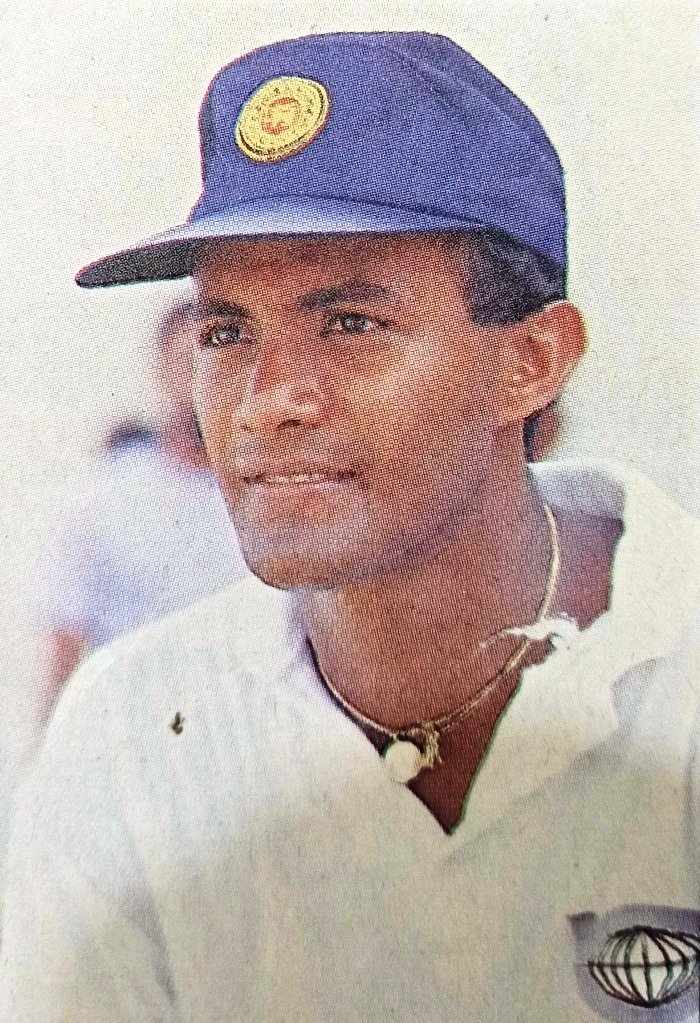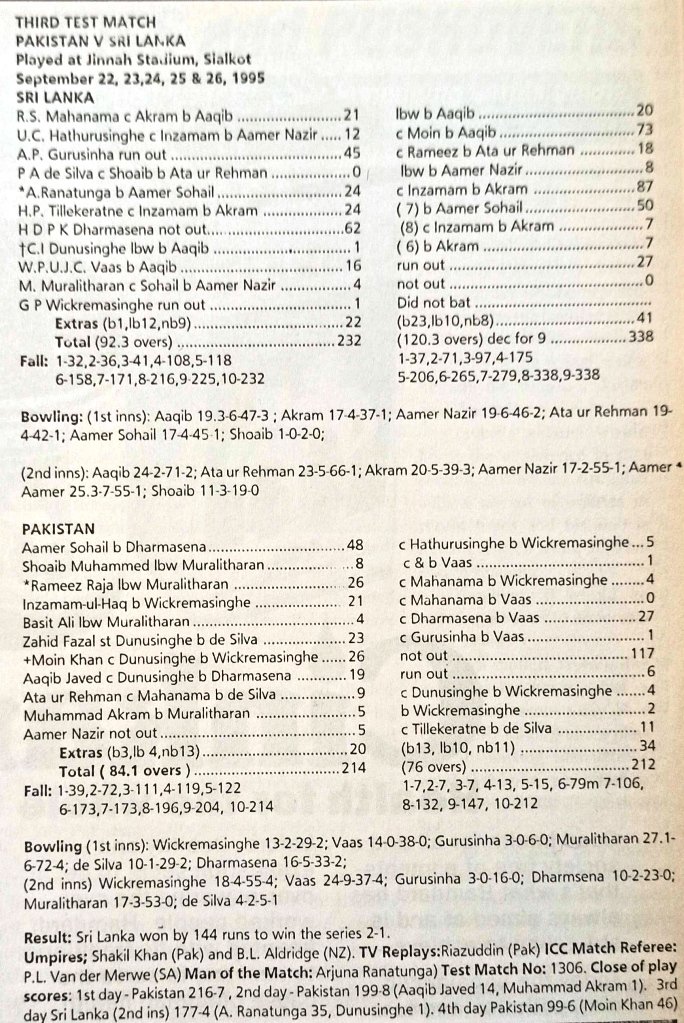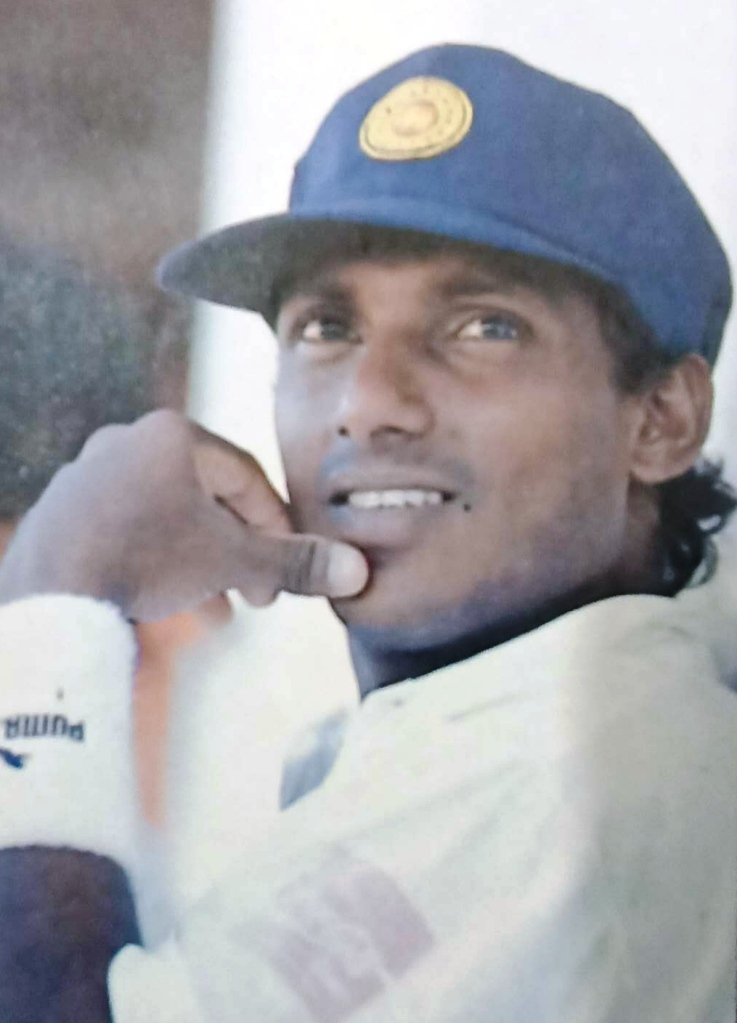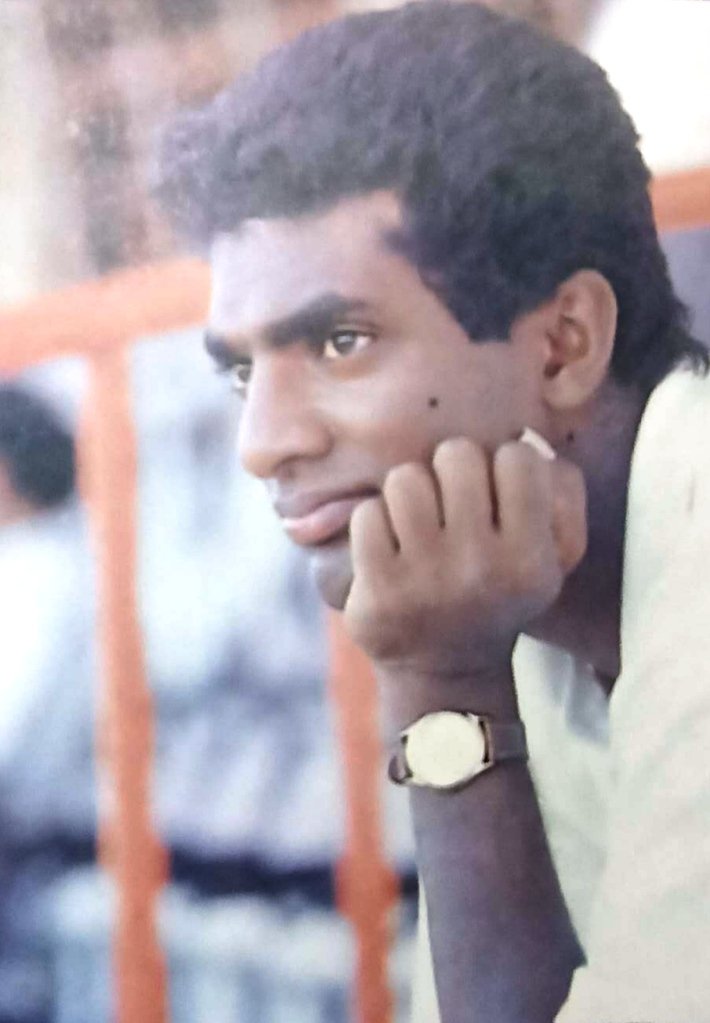An incredible performance as Sri Lanka upset and won its first test series in Pakistan. Cricket is such a thrilling game, creating history with every game played. In this article, we will recall the memorable performance of Sri Lanka’s Upset and Won First Test Series in Pakistan. From that moment on, it was known that Pakistan’s great left-arm fast bowler, Wasim Akram would not be playing at Sialkot in the third and decisive Test.
Pakistan think tank had still insisted on playing four pacers; one had a premonition that history was about to be created at the cost of Pakistan cricket. Wicket Keeper Moin Khan produced a superb rearguard hundred on the final day.
But it was not enough to prevent the Sri Lankan team from registering an emphatic 144-run victory. That gave them their first-ever Test series win over Pakistan and only their second overseas. But within the space of six months, Arjuna Ranatunga set a victory target of 356 runs on the fourth day after tea by Arjuna Ranatunga.
Pakistan never recovered from a humiliating start that saw wickets fall like nine-pins in a matter of minutes. It was Mayhem, and the spectators at the Jinnah Stadium in Sialkot froze in disbelief as they saw Pakistan lose Aamer Sohail, Shoaib Mohammad, Inzamam-ul-Haq, skipper Rameez Raja, and Zahid Fazal for just 15 runs. Left-arm pacers Chaminda Vaas and Pramod Wickremasinghe have done the damage in a matter of a few overs.
It was an amazing collapse of the Pakistan top order, as the batsmen kept on fending or spooning catches close to the wicket. At 5 for 15, the team was in real danger of falling for a total lower than the 62 it recorded against Australia at Perth. But in the midst of the Sri Lankan celebrations and the complete madness in the Pakistan camp,. Wicket Keeper Moin Khan and Basit Ali joined hands to set about a repair operation, which, if certainly not aimed at bringing victory, did go a long way in saving the face of Pakistan cricket.
Basit Ali went a few minutes before close, attempting a wild hook shot off the ice-cool Chaminda Vaas, who got a ball to rear up suddenly from just behind the good-length spot. It was poetic justice that Kumara Dharmasena should bring off a spectacular diving catch at square leg, just when it looked as if Basit Ali would escape with the ball falling in no-man land.
Off-spinner Kumar Dharmasena, the key man for his team at Faisalabad and Sialkot with two fighting and invaluable knocks and important wickets, was intriguingly not even selected as a member of the original touring Sri Lankan squad and only flew in as a replacement for the injured Manjula Munasinghe when the first Test was being played in Peshawar.
It just goes to show that even in Sri Lanka, the selectors are human beings and have their weaknesses. Last recalled for the Test after Saeed Anwar pulled out of the playing eleven on the morning of the match, owing to a mysterious stomach bug, though not entirely convincing in his 27 runs and in the sixth wicket stand of 64 runs with Moin Khan on the fourth evening, did show glimpses of the application, technique, and soothing calm in his fighting knock. That was his hallmark when he first made his debut in the Caribbean in 1993.
Touted as a successor to the incomparable Javed Miandad, Basit Ali has since gone through many highs and lows. However, in Sialkot, in moments of madness, he showed that he was still good enough to win a place in the Pakistan team on sheer merit. He provided opportunities to learn to play more responsibly and build upon good starts. He was back in the team after his infamous retirement episode in Zimbabwe earlier this year, along with Rashid Latif.
Therefore, after having been fined a hefty Rs 50,000 by the cricket authorities for his immature behavior on the African safari, Basit Ali still remains our best hope of the middle order clicking on the forthcoming Australian tour, in particular with the chances of Salim Malik making a comeback remaining dim. When Basit Ali went to Chaminda Vaas, who by then had astonishing figures of 4 for 16 off 12 overs.
Pakistan ended the fourth day tottering on the brink of their second successive defeat to Sri Lanka at 99 for 6. But Moin Khan was still there, and he clearly had other ideas, a fact well illustrated when the players trooped off the field. Wicketkeeper Dunasinghe started to walk off the pitch, arms around Moin Khan, as a sort of consolatory gesture.
The victor shows in moments of grace to the vanquished, but the handsome Pakistani keeper chose to shrug off his counter-parts display of sympathy, and his purposeful strides back to the pavilion indicated that still more drama was in store on the final day. Moin Khan, on the fifth day, made sure that Arjuna Ranatunga and his men were not presented with a cakewalk victory by reaching his second Test hundred.
He kept on adding valuable runs to the total with his less able partners, who, though not lacking in courage and obstinacy,. Moin Khan, in an amazing display of bravery, managed to add 133 runs to the Pakistan total with the four fast bowlers. Moin may not have been outstanding as a wicketkeeper in the series, but certainly his batting was something to cherish, as he notched up two fifties and a hundred, easily emerging as Pakistan’s leading scorer in the three Tests.
On the final day, Moin Khan batted with such fluency and confidence that one wondered if was the same Sri Lankan bowling lineup that had made mince meat out of the Pakistan top order on the preceding evening. Having taken the match beyond lunchtime, the Sri Lankans got more restless. Moin Khan went on to add another 65 runs for the final wicket, along with the obdurate Aamer Nazir who scored 11 runs before becoming the final Pakistan wicket to fall in a Test.
Therefore, Arjuna Ranatunga, who had shown himself to be a better tactician than his counterpart Moin, ended up with 117 not out. From day one, Ranatunga was tactically more competent than Rameez Raja, captaining the side in only his third Test. Even in the dressing rooms, it was apparent that the Sri Lankan think tank pair of coach Dave Whatmore and manager Duleep Mendis had outwitted their more experienced and illustrious counterparts, Mushtaq Muhammad and Majid Khan.
Arjuna Ranatunga’s decision to take a heavy roller on the morning of the fourth day was genius, as it ensured that the Sri Lankans, already 200 runs ahead, would have a wicket, which was cracking up, to bowl on when Pakistan batted later in the day. Hence the decision to bat first by Arjuna Ranatunga on a surface that had a great cosmetic job done on it. And he presented the look of a belter for the fast bowlers, which was questioned by many critics on the first day.
Sri Lankan batting appeared frail, even with Wasim Akram missing due to injury. But as the Test progressed, it became clear that Arjuna Ranatunga had read the wicket magnificently. After the first session, when the four Pakistani pacers, Aaqib Javed, Mohammad Akram, Ata-ur-Rehman, and Aamer Nazir, got plenty of lift and bounce, things started to deteriorate to such an extent.
The balls started to keep ankles high at one end, while at the other end they reared up sharply from a good-length spot for the right-handed batsman. Chaminda Vaas, in fact, exploited the wicket the best in the Test. He kept on bowling in the corridor over the wicket and let the batsmen psyche themselves out. He sparingly used the short-pitched deliveries, but when he did, they were far more effective than the ones sprayed around by the Pakistani in particular in the Sri Lankan second innings.
His haul of nearly 40 wickets in nine Tests so far makes this much-focused youngster one of the best finds for Sri Lanka in many years. The snorter of a ball from Aamir Nazir which informed Lankan opener Chandika Hathurusinghe in the first hour of the match, perhaps gave the Pakistani bowlers the illusion that they were playing in Australia or on a fast Sabina Park wicket in Jamaica.
The bottom line was that it would have been better if Pakistan had played with at least one spinner, either Arshad Khan or the young, left-armed Salman Fazal, in the absence of the injured Wasim Akram and Saqlain Mushtaq. The wicket certainly was tailor-made for the slow bowlers from the third day onwards.
But in retrospect, it was the batting that faltered in both innings. Pakistan had a great chance of dictating to the Sri Lankans when they bowled them out for just 232 early on the second day. But instead of grafting and guaranteeing a sizeable first-inning total,. The home side instead conceded a vital 18-run lead, which in the long run proved to be a major psychological boost for the visiting side.
It is obvious from this series that Pakistan has batting problems aplenty and has yet to get over the absence of Javed Miandad and Salim Malik. To make matters worse, without Wasim Akram or even Waqar Younis, the team lacks a bowler with the killer instinct capable of dictating terms to the lower-order batsmen. Also, there is a little chance of Javed Miandad and Salim Malik coming back for the difficult tour of Australia.
Pakistan has to do with whatever batting talent it has at the moment and to make the best use of the available resources, some serious thinking is required. It would be completely unfair not to hold the Pakistan Cricket Board (PCB), selectors, and the team management not responsible for the Test defeats, but one can only hope now that a lot is learned from the mistakes made in the series.
What is most important now is the Australian tour. On the surface, Pakistan cricket appears to be facing an acute crisis. As far as the batting resources are concerned especially with the two openers and Inzamam-ul-Haq is also not scoring runs. What is of concern is that not all the batting talent available in the country infuses much confidence, which means some stumbles have to be taken and the Champions Trophy in Sharjah is used as a platform to experiment in the batting line-up.
As far as the established players like Aamir Sohail, Saeed Anwar, Inzamam-ul-Haq, Rameez Raja, and Basit Ali are concerned, sooner or later some of them will get among the runs. But what has to be done is to prepare other players Capable of earning Pakistan places on sheer merit and weight of runs. One does not foresee any major problems in the bowling department in Australia and New Zealand.
If Wasim Akram is available He is our leading bowler, and if Waqar Younis is also fit to tour, there is nothing like it. But generally, Pakistan appears to have depth in the bowling department, notwithstanding the Sialkot failure. Aaqib Javed, Muhammad Akram, Aamer Nazir, Saqlain Mushtaq, and Mushtaq Ahmed are all good bowlers as long as Wasim Akram or both the Ws are playing.
There may be many reasons and arguments for Pakistan surrendering the Test series the way they did; nevertheless, the fact remains that the Sri Lankans played like a complete professional outfit to outclass our team. It is never easy for a team to bounce back and go on to win in a three-match series after losing the opening test by a big margin.
The Sri Lankan side showed a lot of character and application to become only the third team this century to have come back and won a three-test series. Pakistan players certainly did not play up to their full potential, and the absence of Wasim Akram was a serious setback to which our players could not respond positively.
The way Sri Lankans come back in Faisalabad and Sialkot after having watched them lose last year at home to a stronger Pakistan team and then in Peshawar convinces one that from now on, it would be foolish for any other Test-playing nation to take them lightly.
After having served as the whipping boy of Test cricket for over a decade, this Sri Lankan side has now passed the crucial test. Thus, one feels like learning to believe in oneself and the ability to win against the odds. It is difficult to say whether the Sri Lankans will win in Australia in totally different conditions. But one thing one can say for sure is that there are going to be no pushovers.
There have been many arguments and discussions about Sri Lanka winning the Test series, and it has been interesting to notice that most of the time it has been assumed by critics that Sri Lanka is a weak team compared to Pakistan. This is unfair since, at the moment, the Sri Lankans have one of the most experienced batting line-ups in the world. In the past, they never won matches because they played without a professional attitude, were not focused, and, more importantly, did not have Test match-winning bowlers.
One has seen this attitude change for the better. The likes of Arevinda de Silva, Arjuna Ranatunga, and Hashan Tillekeratne are batting more responsibly now. In the recent series, not all the Sri Lankan batsmen were in form, but it was interesting to see how the batting order supported each other. If Roshan Mahnama and Gurusinha kept on failing, Arjuna Ranatunga and Hashan Tillekeratne, with the lower order, propped up the batting.
To their good luck, they have now found a couple of bowlers in Chaminda Vaas and Muttiah Muralitharan, who are capable of taking wickets. Thus, the transformation is complete. Unfortunately, from the Pakistani point of view, there was a complete lack of application on the part of the batsmen, whereas, where conviction and confidence are concerned, our players appeared to be overconfident.
The manner in which our batsmen batted in Faisalabad and Sialkot gave me the impression that they believed they were not carrying wooden bats. Hence, the bats were made out of gold, and they just had to touch the ball to see the runs flow, and this is not on in Test cricket. Indeed, this was a memorable Sri Lanka Upset and Won First Test Series in Pakistan. The scorecard is at Cricinfo. Read More: A Lesson from Sri Lanka 1984



